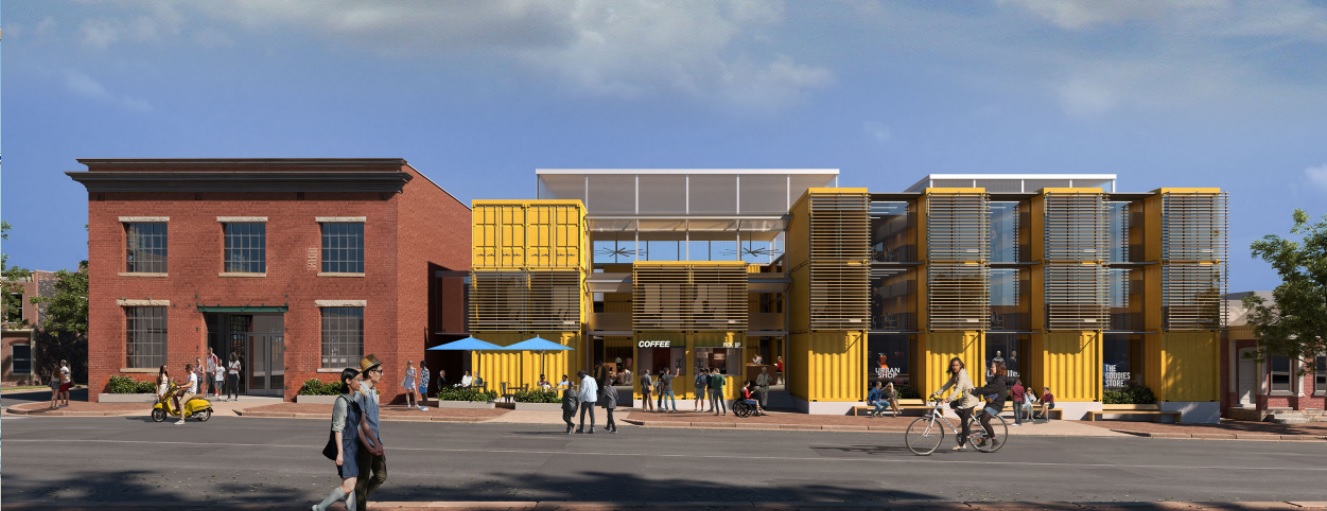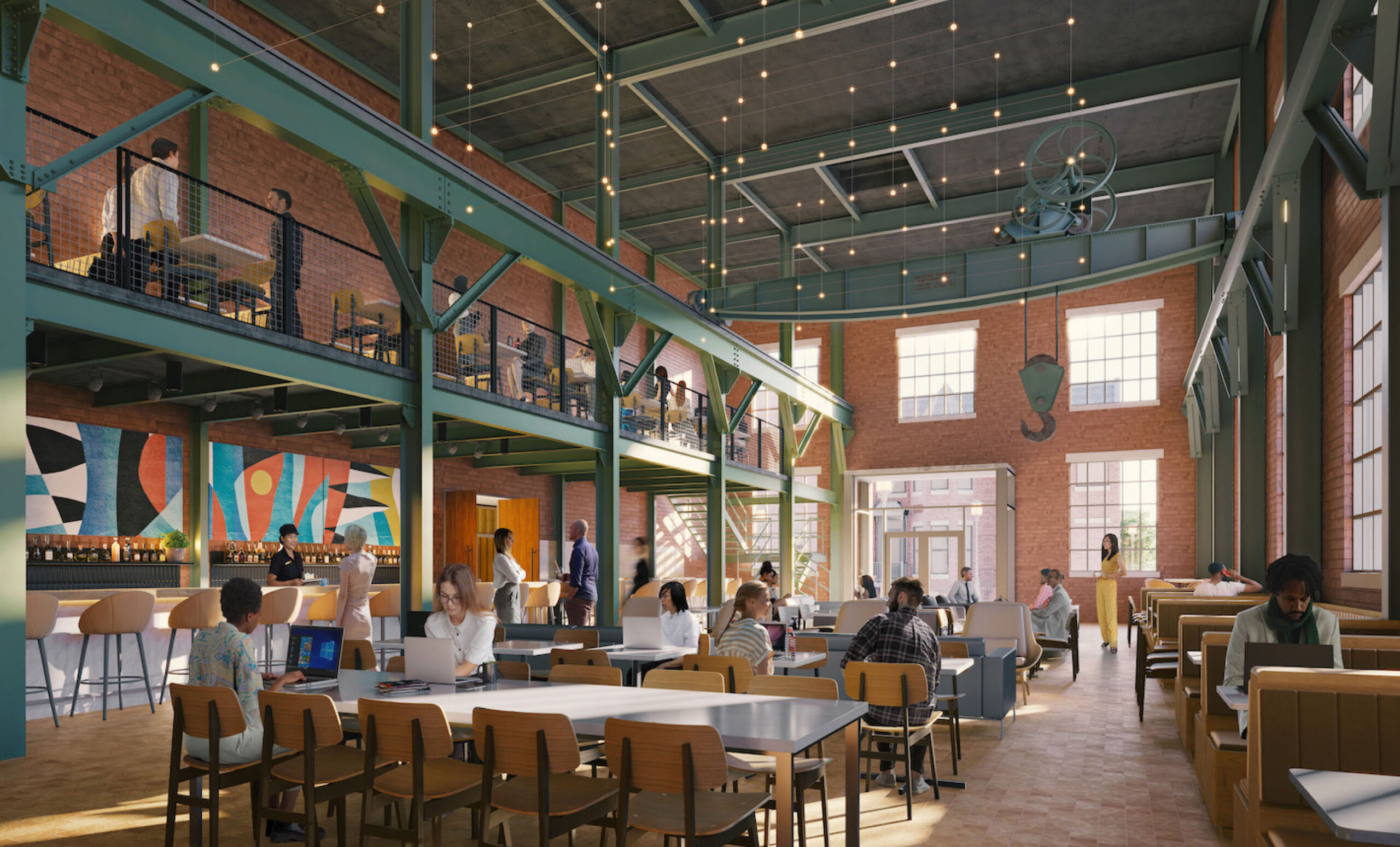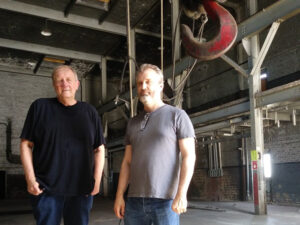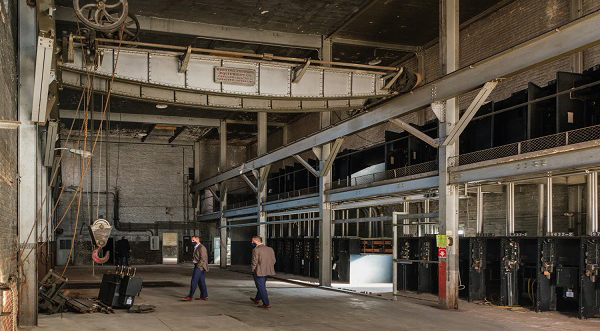
A rendering of Carver Station as it would appear along Clay Street. It would be built in part out of reused shipping containers. (File images courtesy Future Cities)
Note: This story has been updated to clarify that Future Cities is the sole developer on Carver Station. An entity tied to Concord Eastridge purchased the property but the company is not actively involved in the development.
A planned mixed-use conversion of an old power substation in Carver is a step closer to city approval, while proposed changes to city rules for short-term home rentals are getting another look.
The Richmond Planning Commission on Monday endorsed plans for Carver Station, a project to rehab and convert the century-old substation building and adjoining yard at 1120 W. Clay St. into a food hall, gathering room and coworking-office space built in part out of reused shipping containers.
The years-in-the-making project from Richmond-based Future Cities was OK’d as part of the commission’s consent agenda, in which multiple items are voted on as a whole, typically without discussion.
The endorsement came over a year since the firm applied for a special-use permit for the project. The request now goes to City Council, which is scheduled to decide it at its next meeting on Sept. 11.

The old substation building would serve as a community lounge by day and restaurant and wine bar by night.
Envisioned as a gathering space for the Carver community, the project would convert the two-story substation building into a food-and-beverage-style space that would serve as a community lounge by day and a small-plate restaurant and wine bar by night.
The rest of the property would be filled with new construction that would house coworking spaces and “micro-offices,” including office “pods” made from upcycled shipping containers. The new construction would rise as high as three stories above the yard.

Michael Hallmark, left, and Sean Duncan of Future Cities in the old Carver power stationthey plan to convert into a mixed-use development. (BizSense file photo)
Future Cities’ Michael Hallmark, who resides in Carver, is driving the project with firm colleagues Sean Duncan and Jordan Greene.
Hallmark said plans for Carver Station could also include a rooftop farming concept once envisioned for Navy Hill, the downtown development plan he led with frequent collaborator Susan Eastridge that centered on replacing the Richmond Coliseum and was voted down by a majority of council in 2020.
“We are looking more seriously at rooftop farming on top of the substation,” Hallmark said in an interview last week. “We had explored that at Navy Hill a long time ago with a group called Omni Ecosystems, and we want to revive that.”
Describing the substation structure as a great opportunity for rooftop farming, Hallmark added, “That building is really stout, so we want to take the 4,100 square feet of the roof and do some vegetable farming up there.”

The inside of the old “Substation West” in Carver, with the mezzanine and steel-beam crane system visible. (File photo courtesy Michael Hallmark)
Based in Chicago, Omni Ecosystems designs “working landscapes” that facilitate growing crops, managing stormwater and creating habitats, according to its website. The company’s project portfolio stretches across the country.
In addition to Navy Hill, Hallmark and Eastridge, of Fairfax-based Concord Eastridge, were the lead developers on the aborted VCU Health-anchored development that was to replace the city’s old Public Safety Building. They’re currently leading the arena-anchored GreenCity development project in Henrico.
An entity tied to Concord Eastridge purchased the half-acre Carver Station site in 2021 for $1.6 million. While that entity made the purchase, Hallmark said Carver Station is fully owned by Future Cities and does not involve Eastridge or her firm.
Hallmark has said the project is being designed based on feedback from the Carver Area Civic Improvement League and input from area residents and businesses. Architecturefirm is the lead architect on the project, and a contractor has not been selected. Local attorney Mark Kronenthal is providing representation for the permit request.
STR rule change vote deferred
Also at Monday’s meeting, the Planning Commission voted to continue to its Sept. 5 meeting a vote on proposed changes to regulations for short-term home rentals in the city.
In a public hearing that followed a presentation from Planning and Development Review Director Kevin Vonck, speakers were split on a proposal to retain a primary residency requirement in all residential zoning districts, and to remove the requirement in nonresidential districts.
The requirement, in which short-term rental operators could only rent out their own residence or a room within it, has been a point of contention for those who want to rent out more than one property. In drafting the rules in place now, officials had said the requirement was needed to prevent the possibility of operators buying up multiple properties in residential districts and essentially using them as mini-hotels.
Commissioner Burt Pinnock said more time was needed to consider the requirement, and a majority of the commission agreed with his motion. Vonck said he would return to the commission at its Sept. 5 meeting with alternative proposals specific to the residency requirement.

A rendering of Carver Station as it would appear along Clay Street. It would be built in part out of reused shipping containers. (File images courtesy Future Cities)
Note: This story has been updated to clarify that Future Cities is the sole developer on Carver Station. An entity tied to Concord Eastridge purchased the property but the company is not actively involved in the development.
A planned mixed-use conversion of an old power substation in Carver is a step closer to city approval, while proposed changes to city rules for short-term home rentals are getting another look.
The Richmond Planning Commission on Monday endorsed plans for Carver Station, a project to rehab and convert the century-old substation building and adjoining yard at 1120 W. Clay St. into a food hall, gathering room and coworking-office space built in part out of reused shipping containers.
The years-in-the-making project from Richmond-based Future Cities was OK’d as part of the commission’s consent agenda, in which multiple items are voted on as a whole, typically without discussion.
The endorsement came over a year since the firm applied for a special-use permit for the project. The request now goes to City Council, which is scheduled to decide it at its next meeting on Sept. 11.

The old substation building would serve as a community lounge by day and restaurant and wine bar by night.
Envisioned as a gathering space for the Carver community, the project would convert the two-story substation building into a food-and-beverage-style space that would serve as a community lounge by day and a small-plate restaurant and wine bar by night.
The rest of the property would be filled with new construction that would house coworking spaces and “micro-offices,” including office “pods” made from upcycled shipping containers. The new construction would rise as high as three stories above the yard.

Michael Hallmark, left, and Sean Duncan of Future Cities in the old Carver power stationthey plan to convert into a mixed-use development. (BizSense file photo)
Future Cities’ Michael Hallmark, who resides in Carver, is driving the project with firm colleagues Sean Duncan and Jordan Greene.
Hallmark said plans for Carver Station could also include a rooftop farming concept once envisioned for Navy Hill, the downtown development plan he led with frequent collaborator Susan Eastridge that centered on replacing the Richmond Coliseum and was voted down by a majority of council in 2020.
“We are looking more seriously at rooftop farming on top of the substation,” Hallmark said in an interview last week. “We had explored that at Navy Hill a long time ago with a group called Omni Ecosystems, and we want to revive that.”
Describing the substation structure as a great opportunity for rooftop farming, Hallmark added, “That building is really stout, so we want to take the 4,100 square feet of the roof and do some vegetable farming up there.”

The inside of the old “Substation West” in Carver, with the mezzanine and steel-beam crane system visible. (File photo courtesy Michael Hallmark)
Based in Chicago, Omni Ecosystems designs “working landscapes” that facilitate growing crops, managing stormwater and creating habitats, according to its website. The company’s project portfolio stretches across the country.
In addition to Navy Hill, Hallmark and Eastridge, of Fairfax-based Concord Eastridge, were the lead developers on the aborted VCU Health-anchored development that was to replace the city’s old Public Safety Building. They’re currently leading the arena-anchored GreenCity development project in Henrico.
An entity tied to Concord Eastridge purchased the half-acre Carver Station site in 2021 for $1.6 million. While that entity made the purchase, Hallmark said Carver Station is fully owned by Future Cities and does not involve Eastridge or her firm.
Hallmark has said the project is being designed based on feedback from the Carver Area Civic Improvement League and input from area residents and businesses. Architecturefirm is the lead architect on the project, and a contractor has not been selected. Local attorney Mark Kronenthal is providing representation for the permit request.
STR rule change vote deferred
Also at Monday’s meeting, the Planning Commission voted to continue to its Sept. 5 meeting a vote on proposed changes to regulations for short-term home rentals in the city.
In a public hearing that followed a presentation from Planning and Development Review Director Kevin Vonck, speakers were split on a proposal to retain a primary residency requirement in all residential zoning districts, and to remove the requirement in nonresidential districts.
The requirement, in which short-term rental operators could only rent out their own residence or a room within it, has been a point of contention for those who want to rent out more than one property. In drafting the rules in place now, officials had said the requirement was needed to prevent the possibility of operators buying up multiple properties in residential districts and essentially using them as mini-hotels.
Commissioner Burt Pinnock said more time was needed to consider the requirement, and a majority of the commission agreed with his motion. Vonck said he would return to the commission at its Sept. 5 meeting with alternative proposals specific to the residency requirement.




Congrats Michael, Susan and Sean! Love this project and it’s creative and thoughtful design
I have always wanted to do a conversion of the Powerstation at Brown’s Island. That structure it beautiful and looks much like the inside of the Carver station. Just think that would be an amazing place for like a Consultant or IT/ Ai startup.
I agree – beautiful location. A restaurant or restaurant mall would be great.
Re-purposing the Powerstation has long been hampered by it lack of proper access and location within the floodplain. Perhaps with the development of the CoStar tower and the riverfront amphitheater, it’s time will come, but it’ll require a unique use and probably some deep pockets to make it work. The owner is a billionaire but has bigger fish to fry. it’ll probably end up as a public use for arts or educational purposes. Got any ideas?
Yes, it is beautiful and has BIG potential — which is part of the problem — that is ONE BIG SPACE!
I continue to think that the train shed should be a farmer’s marketplace like 6th street in DC, the powerstation is probably too big for that.
If you think the power station is too big you have obviously not been in the train shed.
This space when looked at and designed (with kitchen, bathrooms, tables and other build out designs once you put/determine exterior wall insulations, new canal side wall, and roof) would create a very small leasable space for most national chains and it is too big for a small local place to try out. It has been an issue since D&B and BWW both “looked” at the space when Riverside was newer in the early 2000s.
Bruce the building’s pad at Brown’s Island is only slight below the designed flood elevation of the current Riverside on the James vacant retail spaces. The potential ceilings are so tall you could put in a new and higher concrete pad on it to get the space above the BFE. It is not THAT low. The problem has been a lack of customers, actual space, and parking/access. Sullivans and every other retail/food that went into Riverside on the James have all failed since it was constructed. This old plant space would needs a LOT of work and its very small… Read more »
No I mean the concrete structure on Browns Island which is only accessible by a small bridge from Riverside and is visible from that former restaurant space. It’s been marketed for any number of uses by leading Richmond commercial realtors over the years. It’s been a dead end.I’m hopeful a good use can be found for it.
City’s planning commission is moving forward with more Michael Hallmark and Susan Eastridge projects? Why are they not a little gun shy from the $75 mil fiasco VCU just went through? If for no other reason than bad press?
The proposals have to stand on their own. Hallmark didn’t force VCU to sign that lopsided lease nor did it vote down its TIF proposed development on Navy Hill. I think the City Council made the right decision to explore options that involved less public risk but then VCU leaped into the abyss. This proposal is small fry by comparison but it’s got a lot of promise and has an upside for the city and Carver in particular. And in my opinion, it’s quite attractive. My eyes are on Hallmark’s proposed development of Green City in Henrico wherein the county… Read more »
Agree – I have been asking Jonathan (the journalist here) to press Henrico on their justification on staying with Hallmark for Green City, and have yet to see Vitoulkous have any public comment on what he has done to protect Henrico taxpayers form the same fate as VCU.
They have to stay the course for now or they will suffer the same fate for pulling out of an agreement without just cause. Hallmark will have to meet certain metrics according the agreement. If they do not then the County will be able to cancel the deal.
I hope the City discourages large companies like Blackstone who purchase properties to ONLY rent them out. The city needs more primary residence owners – not corporations who do not add to the community. Yes, there are many positives for primary residence requirements.
Good hope but the market will most likely drive the sale but yeah I think the fear is the rule relaxations and the City’s LACK of enforcement (and hollow promise it “will” work better) means we will see what you (and others) fear!